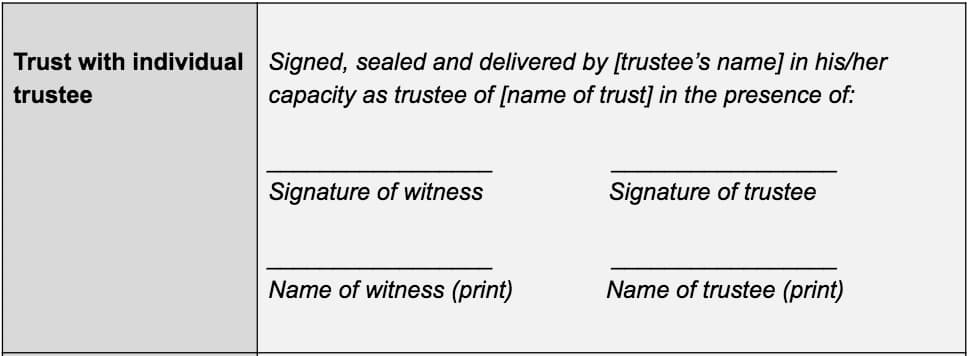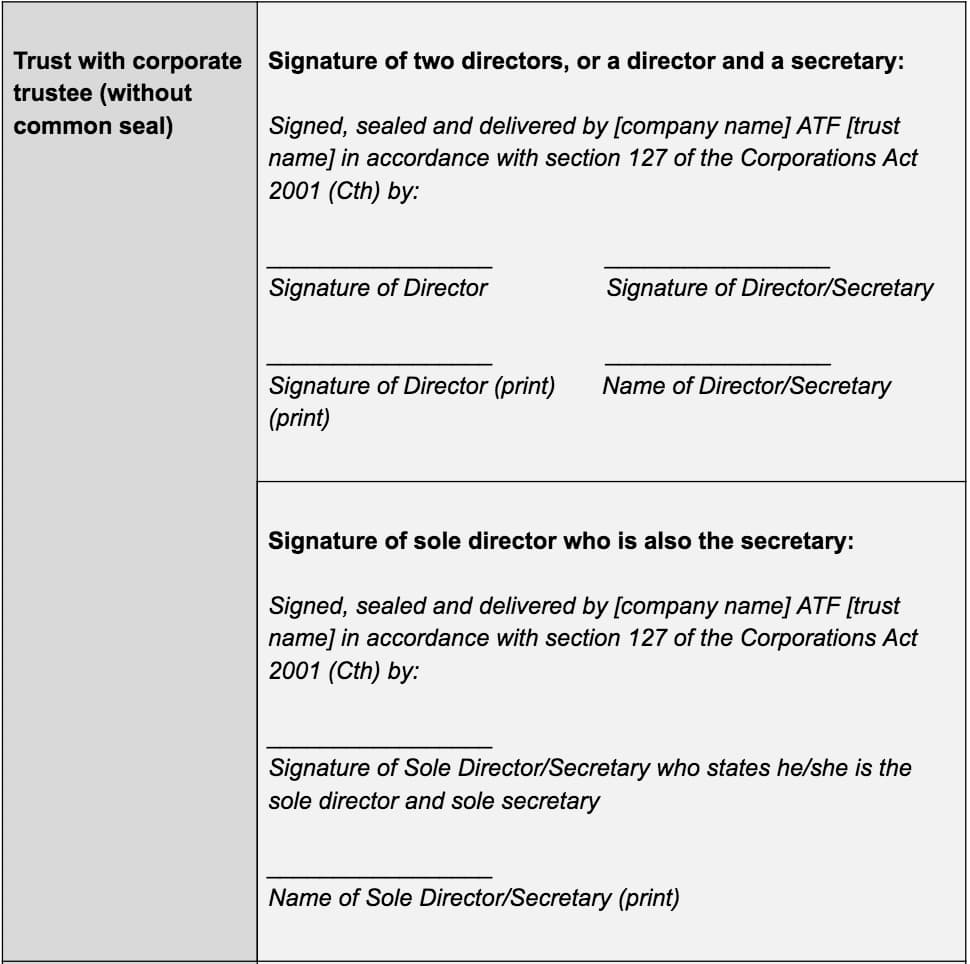The use of deeds is common in commercial transactions, so it is important to understand how to execute them correctly. There are strict requirements, and if an individual, partnership or company does not follow these requirements, a court will not enforce the deed. This article will set out the process of correctly executing deeds for different business structures and arrangements.
What is a Deed?
A deed is a binding promise or commitment to do something. It is important to note that deeds are different from agreements or contracts.
At its simplest, the main difference between a deed and an agreement or contract is that a deed does not require consideration (i.e. the exchange of something valuable such as money) to be binding.
However, deeds still require:
- offer and acceptance of the terms of the arrangement; and
- the intention of the parties to be legally bound.
As deeds do not require consideration, the parties’ intention to be bound by the deed will depend more on whether the parties have completed the deed correctly rather than surrounding circumstances. Therefore, deeds have strict execution requirements, and individuals, partnerships and companies must complete them correctly, or the deed will be unenforceable.
Execution of Deeds
For a deed to be binding under general law, the deed must:
- be in writing;
- have a seal on the document; and
- be delivered to the other party to the deed.
Seal
Historically, the concept of a ‘seal’ came in the form of a wax seal which was affixed to a document to authenticate it. Nowadays, using wax seals is not common. Instead, execution blocks on deeds (where the parties sign the document) state that the party has “signed, sealed and delivered” the deed. As such, you do not need to have a seal physically placed on the document.
Delivery
Delivery refers to the date when a court will consider that a deed is effective. From this date, the deed will bind the parties. Historically, there was a requirement to actually deliver the deed document from one party to another. Nowadays, there is typically no need to physically deliver the deed to the other party. As a general rule, a court will presume that a correctly executed deed has been ‘delivered’ unless circumstances show otherwise.
It is also important to be aware that the execution of deeds for certain types of transactions will be subject to particular requirements under legislation. For example, in New South Wales (NSW), a deed passing an interest in real property has specific execution and witnessing requirements.
Executing a Deed
Valid execution of a deed is largely dependent on the correct execution block being signed by the contracting parties. We set out information on how to select the right execution block depending on the type of contracting party as follows.

If you are a company director, complying with directors’ duties are core to adhering to corporate governance laws.
This guide will help you understand the directors’ duties that apply to you within the Australian corporate law framework.
Call 1300 544 755 for urgent assistance.
Otherwise, complete this form, and we will contact you within one business day.
Individuals
The execution of deeds by individuals should include the individual’s name and their signature.
Many states and territories have legislation which explicitly require that someone witnesses the signing of the deed. However, even if the laws of your state and territory do not require witnesses, it is still best practice to have a witness, as it serves as evidence of the actual execution of the deed as it appears.
The witness should be a third-party adult of sound mind who is not a party to the deed.

Partnerships
The main ways that partnerships can execute deeds is by:
- a partner executing the deed on behalf of the partnership where the partner has explicit authority to do so; or
- all partners executing the deed on behalf of the partnership.
With deeds, a partner must have explicit authority from a separate deed to sign on behalf of the partnership. This is different from agreements where a partner is generally presumed to have the ability in law to execute on behalf of the partnership.
This authority can be set out in a power of attorney or partnership deed.
If the above two methods are not appropriate or possible, a deed may be binding where a partner has executed the deed in the presence of all other partners.
When a partner is executing on behalf of the partnership, a third party should witness the signing, as many state and territory laws require this for the execution of deeds. Furthermore, a person witnessing the signing is recommended best practice even if it is not strictly required.

Companies
Corporations Act
The most common way for companies to execute deeds is to follow the methods set out in the Corporations Act.
The Corporations Act states that a company can execute a deed by having it signed by:
- two directors of the company;
- one director and one company secretary; or
- for proprietary companies only, the sole director who is also the company secretary.
Executing deeds in accordance with these methods is useful and reliable. This is because the Corporations Act states that if a deed is executed in these ways, the court will presume that is has been correctly executed, unless the parties knew or suspected at the time of dealings that the assumption was incorrect.
A less common method of execution of deeds is using the company’s common seal. The seal is an ink stamp that the company presses onto a document, symbolising their acceptance of the agreement. The use of the common seal requires witnesses. This can be:
- two directors of the company;
- one director and one company secretary; or
- for proprietary companies only, the sole director who is also the company secretary.
Deeds require an attorney to be appointed by a separate deed. This deed must grant that person an explicit ability to execute deeds on behalf of the company.
This is different from agreements where companies may appoint agents or authorised representations by way of a board resolution to sign agreements on behalf of the company.


Trusts
Trustees execute deeds on behalf of trusts. The method of doing so will depend on whether it is an individual trustee or a corporate trustee.
The way individual trustees will execute deeds is similar to individuals. Likewise, corporate trustees will execute deeds in a similar way to companies.
The execution block should explicitly state that the signatory is executing the deed in its capacity as trustee or “as trustee for” (‘ATF’) the trust.
Whenever a trust is looking to sign a deed, the trust deed should be reviewed to ensure the purported trustee has the authority to execute the deed on behalf of the trust.



Electronic Execution
The Electronic Transactions Act 1999 allows parties to use an electronic signature in Australia. As a result, under Australian law, contracts are also enforceable if they are electronically signed.
Key Takeaways
For a deed to be valid and enforceable, the law requires that individuals, partnerships and companies follow certain formalities. If your business is executing a deed, make sure you understand the capacity in which the signatory is signing the document and if that person has the authority to enter that transaction. This is especially important if executing the deed on behalf of a business entity, where more complicated processes may apply.
If you need advice on a deed or how to correctly execute one, our experienced contract lawyers can assist as part of our LegalVision membership. For a low monthly fee, you will have unlimited access to lawyers to answer your questions and draft and review your documents. Call us today on 1300 544 755 or visit our membership page.
Frequently Asked Questions
A deed is a binding promise or commitment that creates a legal arrangement between two or more parties. It is similar to a contract, however, they differ in some key areas. To execute a deed and create a binding legal arrangement, the deed must be in writing, have a seal on the document and be delivered to the other party.
A deed differs from an agreement or contract because it does not require any consideration. This means that there does not need to be an exchange or something valuable for the arrangement to be binding. Therefore, a deed can wholly benefit one side.
To execute a deed as an individual, you should include your name and signature on the document. Often, state and territory legislation will require someone to witness the signing of the deed.
Your company must execute a deed in accordance by the Corporations Act, by having it signed by: (1) two directors of the company; (2) one director and one company secretary; or (3) for proprietary companies, the sole director who is also the company secretary.
We appreciate your feedback – your submission has been successfully received.











